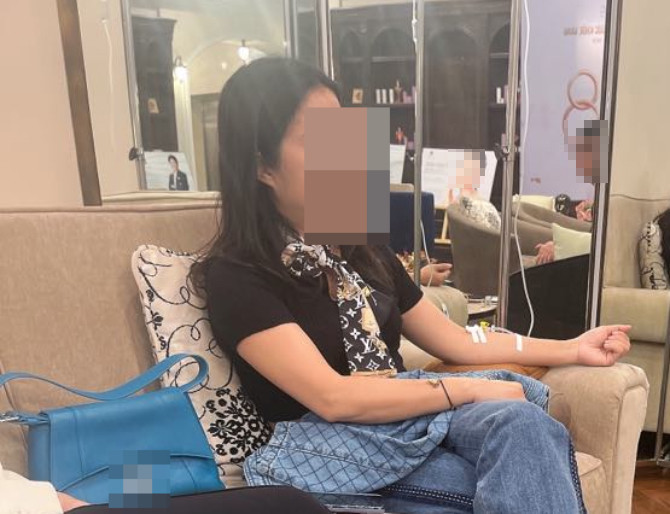
In Hanoi, the Nicotinamide Mononucleotide (NMN) infusion service is gaining attention with claims of rejuvenating the body, improving health, and extending lifespan. Many are willing to spend hundreds of millions of VND on this therapy, despite ongoing debates about its effectiveness and safety.
B.D.H, 45, from Cau Giay, Hanoi said after being hospitalized for acute pancreatitis and declining health, a friend introduced him to NMN infusion therapy. He spent about VND400 million hoping to improve his condition.
Similarly, N.T.H from Hoan Kiem district, Hanoi, chose this method to address chronic hives, skin discoloration, and weak liver and kidney function. Previously, she underwent similar treatments in Singapore but has switched to a local facility due to lower costs, about one-fifth of the price.
According to some facilities in Hanoi, NMN is introduced as a Japanese technology with anti-aging, cell regeneration, and metabolism-enhancing capabilities. T.T.D from Hai Ba Trung, Hanoi, a service provider, said the treatment package for women lasts six months, with one session per month, costing VND90-100 million. For men, costs can reach VND200 million, as men reportedly need more "detox" due to bad habits like alcohol consumption.
The documents shown by T.T.D showed that NMN prevents neurodegeneration, rejuvenates cells, and extends lifespan. One advertisement piece even says NMN could help humans reach a lifespan of 140 years in the future. However, these claims have not been verified and confirmed by reputable health authorities.
No human studies
Dr Pham Nguyen Quy from the Department of Medical Oncology of Kyoto Miniren Central Hospital, Japan, explained that NMN, a precursor to nicotinamide adenine dinucleotide (NAD+), has DNA repair and protection effects in experimental models.
However, the compound is still under research, and there have been no clinical trials proving that NMN infusion or supplementation can cure diseases or reverse aging.
In Japan, treatments with NMN are not approved under the Pharmaceuticals and Medical Devices Law. Services or products claiming NMN can treat specific conditions (like diabetes or atherosclerosis) or improve functions (like metabolism, vision, or mental clarity) face penalties. Thus, people should be cautious of efficacy claims in Vietnam and avoid placing too much trust in this therapy.
Quy emphasized that claims about benefits must be backed by real-world data, such as how much longer 100 users live compared to 100 non-users.
"Current NMN marketing is just speculative. People use it and hope for results," Quy said.
Dr Ngo Duc Hung, Master of Medicine from the Emergency Department of the Hanoi Medical University Hospital, warned that NMN infusions carry risks of allergies or anaphylactic shock. Many patients have recently been hospitalized after infusions at unlicensed facilities. "Any infusion method carries risks, especially when performed in substandard medical conditions," he said.
International health organizations like the World Health Organization and US Food and Drug Administration have not recognized NMN as an effective treatment for any condition. Experts urge caution with unproven therapies. Instead of relying on advertisements, consumers should consult doctors before making decisions.
Dr Quy advised that to maintain health and prevent aging, proven methods such as a healthy diet, regular exercise and maintaining a scientific lifestyle should be prioritized. “People need to learn carefully from reliable sources and avoid being drawn into baseless advertisements,” he said.
The NMN infusion service is gaining traction in Vietnam with promises of better health and rejuvenation. However, with limited scientific evidence and potential health risks, people should approach information cautiously. Consulting doctors and choosing reliable healthcare methods is a safer and more effective approach in the current context.
Analysts commented that Vietnamese people, with improved incomes, tend to use new therapies to better their health conditions and cure aging, though they remain familiar and are very costly.
Recently, Associate Prof Nguyen Lan Hieu, Director of Hanoi Medical University Hospital, said many people are flocking to blood filtration services to remove blood lipids and treat various diseases. Numerous facilities advertise that blood filtration can eliminate blood lipids, "bad blood," and prevent stroke, atherosclerosis, diabetes, and fatty liver. Some even offer trips to Singapore or Japan for the treatments.
"If spending 2-3 hours and less than VND10 million could prevent stroke and eliminate blood lipids or diabetes, cardiologists like me would be out of a job. A truly effective method would be included in professional association guidelines, but as of now, there are no recommendations for preventive blood filtration," Hieu said.
Phuong Thuy